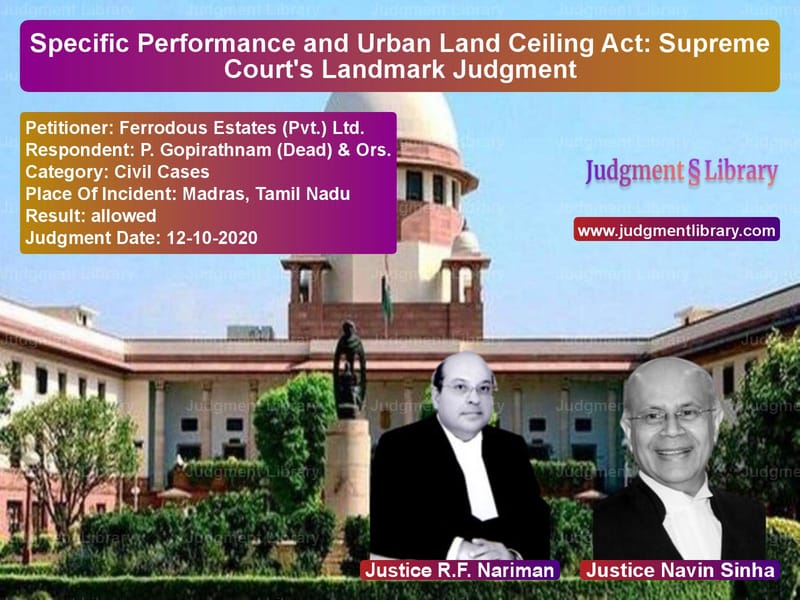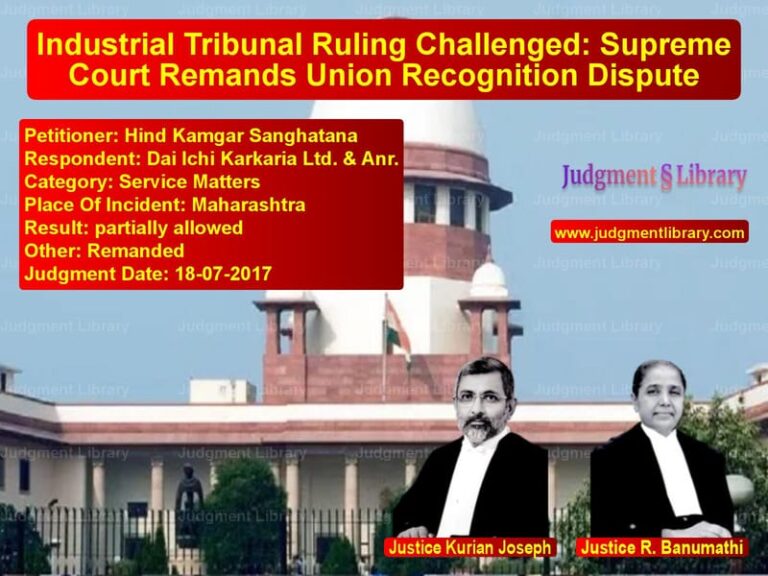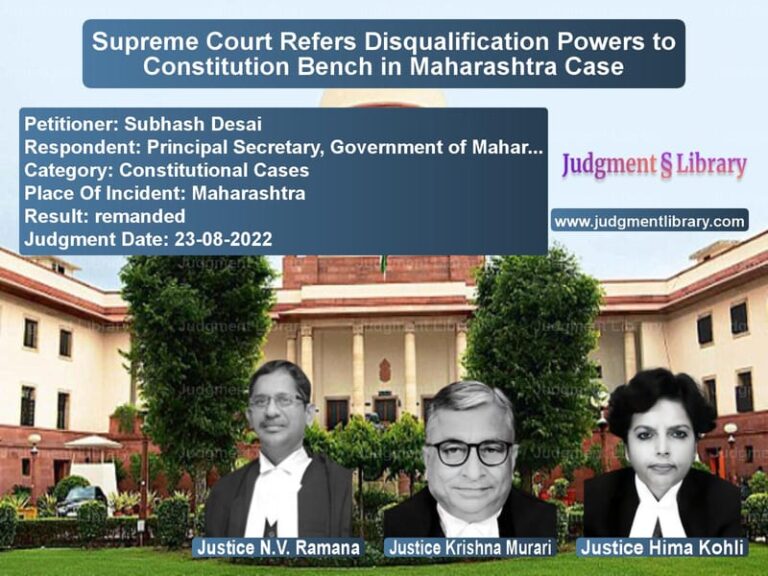Specific Performance and Urban Land Ceiling Act: Supreme Court’s Landmark Judgment
The case of Ferrodous Estates (Pvt.) Ltd. vs. P. Gopirathnam (Dead) & Ors. is a significant legal battle concerning the enforcement of a specific performance contract amid regulatory constraints imposed by the Tamil Nadu Urban Land (Ceiling & Regulation) Act, 1978. The case revolves around a sale agreement dated 12.06.1980, under which the appellant sought to enforce the transfer of property that was allegedly in excess of the prescribed ceiling limits.
Background of the Case
The appellant, Ferrodous Estates (Pvt.) Ltd., entered into an agreement to purchase a piece of land measuring 8 grounds and 2354 square feet from four defendants. The agreement stipulated that the vendors were responsible for obtaining necessary clearances, including permission under the Tamil Nadu Urban Land Ceiling Act.
Dispute and Legal Proceedings
Due to the failure of the defendants to obtain the necessary approvals, the appellant filed a suit for specific performance, arguing that they were ready and willing to perform their obligations. However, the defendants contended that the agreement was void since it violated the provisions of the Urban Land Ceiling Act, which restricted landholding beyond a certain limit.
Findings of the High Court
The High Court initially ruled in favor of the appellant, directing the execution of the sale deed. However, a Full Bench of the High Court later opined that the agreement was unenforceable as it contravened the Urban Land Ceiling Act, leading to the dismissal of the appellant’s claim for specific performance.
Contentions of the Parties
Appellant’s Arguments
- The agreement required the vendors to obtain permission under the Urban Land Ceiling Act, and their failure to do so constituted a breach.
- The contract should be enforced as it was not inherently illegal but only required procedural compliance.
- The repeal of the Urban Land Ceiling Act in 1999 removed any legal impediments to enforcing the contract.
- The Division Bench erred in treating the agreement as void ab initio.
Respondents’ Arguments
- The agreement was void from the outset as it contravened the Urban Land Ceiling Act.
- The repeal of the Act did not revive a contract that was originally illegal.
- The High Court’s Full Bench ruling on the enforceability of the agreement was binding.
- The appellant had been granted monetary compensation, making specific performance unnecessary.
Supreme Court’s Analysis and Judgment
1. Enforceability of the Agreement
The Supreme Court ruled that the agreement was not void ab initio, as it explicitly required the vendors to secure necessary approvals. The Court emphasized:
“Section 6 of the Act prohibits transfer of excess land, but it does not bar agreements subject to necessary clearances. The vendors’ failure to obtain such clearance should not invalidate the agreement.”
2. Effect of the Repeal of the Urban Land Ceiling Act
The Court held that since the Act had been repealed, no legal obstacle remained to prevent the execution of the contract. It noted:
“The repeal of the Act removes any constraints on landholding limits, thereby reviving enforceability of agreements that were initially subject to regulatory approvals.”
3. Discretionary Nature of Specific Performance
The Court acknowledged that specific performance is a discretionary remedy and examined whether enforcing the agreement would be equitable. It rejected the argument that price escalation over time should be a factor against enforcement:
“Specific performance cannot be denied solely on the ground of increased property value, especially when the delay is due to prolonged litigation.”
4. Conditional Performance
The Court allowed specific performance subject to the appellant paying an additional amount to account for changed circumstances:
“The appellant shall pay Rs. 1.25 crores to the respondents in addition to the agreed consideration, ensuring fairness and equity.”
Final Verdict
The Supreme Court set aside the High Court’s Division Bench ruling and restored the decree for specific performance, subject to the additional payment. This judgment clarifies that:
- Agreements requiring regulatory approvals are not void ab initio.
- Repeal of restrictive laws can revive enforceability of past agreements.
- Price escalation alone is not a ground to deny specific performance.
- Courts may impose fair conditions while enforcing contracts.
This ruling serves as a crucial precedent in specific performance suits, particularly in cases involving regulatory constraints.
Petitioner Name: Ferrodous Estates (Pvt.) Ltd..Respondent Name: P. Gopirathnam (Dead) & Ors..Judgment By: Justice R.F. Nariman, Justice Navin Sinha.Place Of Incident: Madras, Tamil Nadu.Judgment Date: 12-10-2020.
Don’t miss out on the full details! Download the complete judgment in PDF format below and gain valuable insights instantly!
Download Judgment: Ferrodous Estates (P vs P. Gopirathnam (Dead Supreme Court of India Judgment Dated 12-10-2020.pdf
Direct Downlaod Judgment: Direct downlaod this Judgment
See all petitions in Specific Performance
See all petitions in Property Disputes
See all petitions in Judgment by Rohinton Fali Nariman
See all petitions in Judgment by Navin Sinha
See all petitions in allowed
See all petitions in supreme court of India judgments October 2020
See all petitions in 2020 judgments
See all posts in Civil Cases Category
See all allowed petitions in Civil Cases Category
See all Dismissed petitions in Civil Cases Category
See all partially allowed petitions in Civil Cases Category







